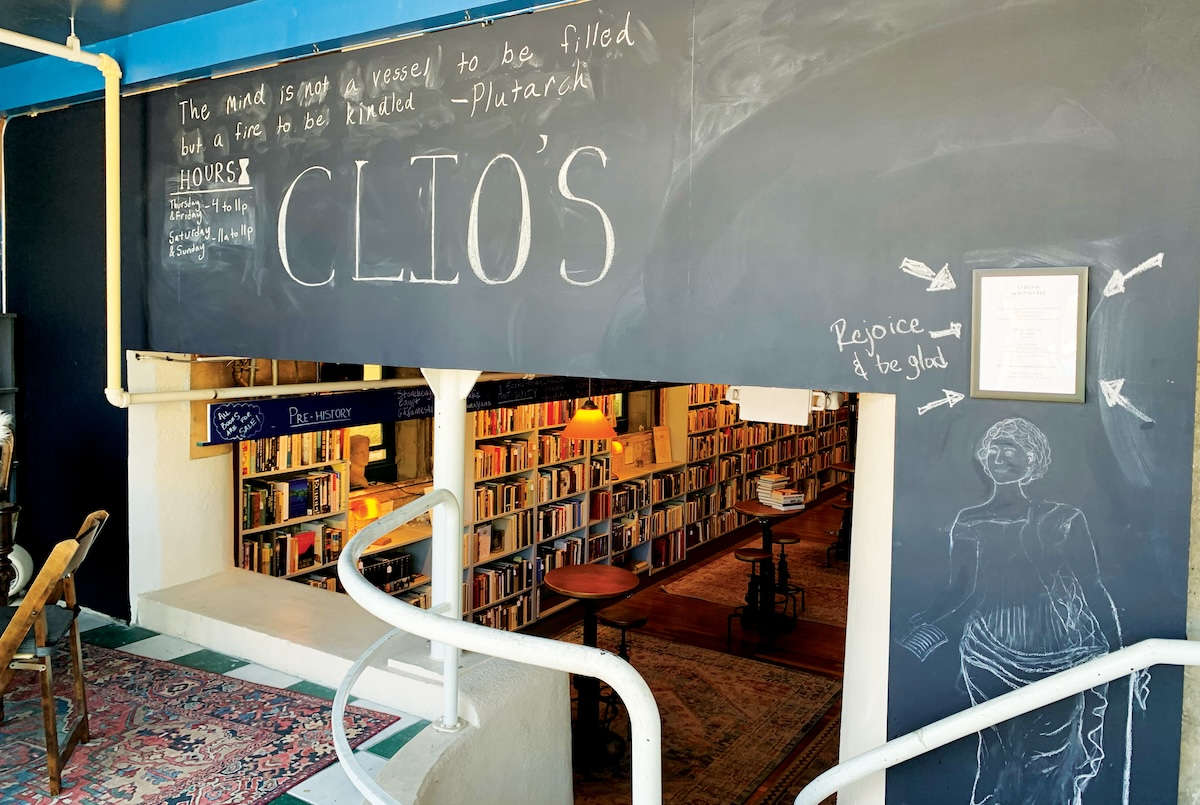There is a moment in the movie American Fiction that Timothy Don references. This came up in conversation about his interesting organizing style for Clio’s, the bookstore-bar which he owns.
It’s the moment where Theolonious “Monk” Ellison (Jeffrey Wright) asks a clerk why his books are set in the African American studies section when they are retellings of Greek myths. The clerk responds that it’s because the author is Black. Monk removes his sunglasses, revealing he is the author. Eventually, when the clerk tells Monk he has no power to determine where the books go, Monk takes it upon himself to move them to the appropriate section.
Late nights, before Clio’s officially opened, Don would open boxes of books and determine where everything would go. When did Cervantes write Don Quixote? Where do writers, philosophers, artists and more, outside of the Western canon, go? These initial questions built the foundation of the initial chronology. Interspersed with these archival books were contemporary retellings. Cersei Miller’s Song of Achilles was placed next to The Iliad. Don commented that including these modern versions of these stories “keeps the archive alive.”
All the books at Clio’s are organized through the history of ideas. Clio’s is a venture that in Don’s estimation took 25 years to reach fruition. From receiving his master’s from the New School University to becoming art editor at the Lapham’s Quarterly, he then went on to found and run the Oakland Book Festival from 2015 to 2017. Opening Clio’s after running the Oakland Book Festival seemed like an almost seamless transition. Sitting between Grand and Perkins, Clio’s is the culmination of Don’s efforts, where he has materialized a history of ideas in a single location.
Certain parameters operate within the store. There is no book donation Don will turn down, and patrons should avoid using their phones. He once mentioned that he would not accept cookbooks or self-help books—yet he doesn’t take an elitist position against these genres. Clio’s accepts books in the culinary arts, which are placed next to the art books. As for self-help books, he jokingly said they can be found behind the bar. He later clarified his position.
“It’s just that many of the self-help books we see are extracted from previous wisdoms,” Don said. “Whether it’s Marcus Aurelius and the Stoics, you know, whether it’s Epicurus, whether it’s Viktor Frankl on existential psychology and living in the shadow of the Holocaust …”
For the most part, he’s unsure where to place them. When pressed further about whether there is a book he will not accept, he reiterated that there is not, demonstrated by the fact that he once placed Mein Kampf on a shelf.
In an estate sale, Don picked up a box of books, which included Mein Kampf. He faced the uncertainty of whether or not to include it at Clio’s, but reasoned, “It is an archive of human history. We are not editorializing. We are not telling you what to read here. We’re collecting history, and Mein Kampf is a historical object. So I shelved it.”
After a couple of months, he noticed it was missing. He looked behind the stack and realized someone must have bought it. He said it’s not a book he’s going to buy again, but that he is still committed to the ethos of not rejecting a book donation.
Regarding the second rule, he gently pushed against patrons being on their screens, saying they should engage with the books or with each other. For Clio’s, people, for the most part, abide by this rule. Don is not opposed to a web presence, as he plans for Clio’s to have a website.
He is appreciative of the surrounding community and their efforts to bring the bookstore-bar to fruition. Don described the swell of people he encounters on Friday nights as due to word-of-mouth advertising. The initial spate of books came from donations, especially from Creative Growth, a nonprofit organization based in Oakland. Don recognizes that Clio’s is a neighborhood spot.
But Clio’s has the potential to be many things. Don discussed possibilities for the future. There will be a fireman’s special and potentially a food service with small plates, plus there will be a coffee service in the morning. Clio’s is a hosting place for a series of programs. Usually there is an overarching program for the year, and this year is centered on “friendship.” Fingers are crossed for Elena Ferrante as a potential speaker.
This summer, Clio’s will also host a program called “Men of Dark Times,” in which Cal professors will conduct a series of conversations. When speaking to the dismal state of the publishing industry, Don said he foresees Clio’s potentially being a publisher of local Bay Area authors. In short, he has ideas.
While Don waxed poetic about what Clio’s can become, he repeated this refrain he picked from a random patron: “Real books, real people, real drinks.” It’s a throughline he wants to abide by. Theorizing about the state of the world with like-minded individuals—well, that is always welcome.
Clio’s, open 4-11pm Mon, Thu and Fri; 11am to 11pm Sat-Sun; 353 Grand Ave., Oakland.










